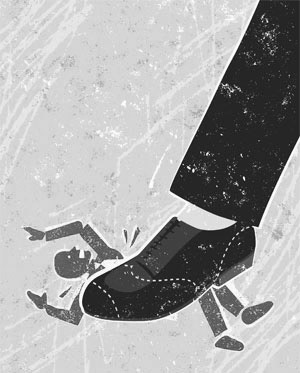When the US Justice Department announced last August that it was levying a $17 billion penalty against Bank of America for its role in bringing on the mid-2000s housing crisis, pundits said the sheer size of the fine would make all banks take notice. Visions of bankers conducting themselves in a legal, even socially responsible, manner danced in the minds of consumer advocates.

No such luck. Despite the announced penalty being equal to about one year’s profit for the bank, and ten percent of the value of its stock, that day Bank of America’s stock went up more than four percent. Shareholders were apparently happy to see the problem quantified. On the same day that the bank accepted a gigantic penalty, it was the best-performing financial stock of the day.
Bank of America was the Wall Street equivalent of Taylor Swift, content to shake it off, shake it off.
Since the effects of the big banks’ early-2000s lending and securitizing practices first started making the nation’s economy tremble, many people have dreamed of seeing the banks and their executives punished. Members of the Occupy movement and others called for jail time for bank executives, as payback for helping devastate a once-thriving national economy.
In the rare event that a banker goes to jail, though, typically a low- end employee gets pinned with the blame and takes one for the team. Last week in Kansas, a former bank loan officer pled guilty to fraud for falsifying documents. The recommended sentence was rather meager: six months in prison, followed by six months home detention. Criminal penalties for villainous bank executives generally remain a fantasy that doesn’t line up with reality. The reality is this: the banks see fines, no matter how big, as merely the cost of doing business.
The Consumer Financial Protection Bureau fined Michigan’s Flagstar Bank $37.5 million last September after finding that the lender violated lending rules numerous times while ostensibly helping homeowners get their mortgages modified. A year earlier, JP Morgan Chase agreed to pay $13 billion as a result of regulators’ investigations into its mortgage activities.
One penalty was relatively small–at least compared to the other, which was huge. To their respective banks, both amounted to little more than speed bumps.
Despite having paid out over a quarter-trillion dollars in fines overall, banks haven’t appreciably changes their practices. Consumer abuse continues for one reason: it’s so profitable.
We saw this last fall when New York regulators announced that Ocwen Financial had backdated letters to potentially hundreds of thousands of troubled mortgagees. These misdated letters deprived modifications to struggling homeowners and expedited the process of seizing homes. Ocwen blamed the misdeeds on “software problems.”
Ocwen Federal Bank is no longer a bank – operations were terminated by an Office of Thrift Supervision enforcement action in 2005. Incredibly, Ocwen subsequently blossomed into the nation’s largest nonbank mortgage servicer. In other words, sometimes even shutting down a bank isn’t punishment enough: the corpse rises up as a mortgage servicer and continues abusing consumers.
At one point, it seemed that California, at least, was going to give Ocwen a penalty that would really hurt. California threatened to suspend the firm’s state license. That would have shut down Ocwen’s operations in the nation’s most populous state, a punishment which surely would have been hard to shake off.
In the end, California relented and instead disciplined Ocwen with a $2.5 million fine that had about as much impact as getting a parking ticket does on most of us. Sure, it’s an annoyance and diverts money that could have been spent on something more useful. But, ultimately, the driver doesn’t lose sleep over paying the fine.
For big banks, the regulators aren’t the stuff of nightmares, either. They’re more like a toll booth along a highway built on the crushed dreams of millions of Americans.
This article originally appears at Huffington Post: http://www.huffingtonpost.com/jorge-newbery/big-banks-abuse-consumers_b_6969384.html

 440 S LaSalle Street, Suite 1110, Chicago,IL 60605
440 S LaSalle Street, Suite 1110, Chicago,IL 60605




